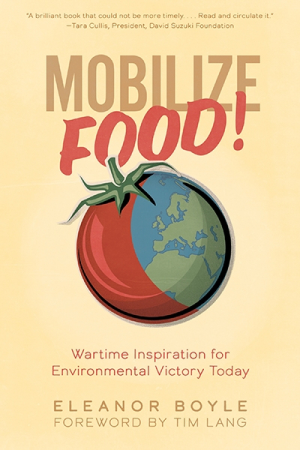Mobilize Food!
Wartime Inspiration for Environmental Victory Today
Both a history book and an environmental analysis, Mobilize Food! suggests a compelling way forward through the examples of the past.
Eleanor Boyle’s environmentally conscious book Mobilize Food! is a provocative call to arms for sustainability. Utilizing the example of Britain’s wartime responses to food shortages and rationing, Boyle makes a case for taking extreme measures to combat climate change.
The book begins by surveying the dire realities of climate change. It then investigates the role that the food industry plays in deforestation, the production of greenhouse gases, and other negative environmental effects. It says that humanity’s overreliance on meat as a source of protein, particularly in developed countries, has a tremendous carbon footprint, in part because of the transportation of foods over long distances.
What to do about this unsustainable situation? By looking back into history, the book identifies a time and place that has parallels to today’s climate crisis. During World War II Britain was faced with a threat to civilization that Boyle calls as daunting as today’s environmental emergencies: the Nazi war machine rolled through Europe, threatening to bury the Western world under a thousand-year rule. Britons faced this threat by bonding together, giving up what they didn’t need, and by giving to those who needed help. Food was rationed and distributed according to need. A comparable solution to the ecological crisis, the book says, would not be technological, but rather social. Boyle encourages people (especially in the West) to adopt the same sense of urgency and solidarity that characterized wartime Britain.
To combat naysayers and assuage concerns, such as that meat shortages and abstinence from high calorie foods could weaken people, the book references the health impacts of Britain’s wartime rationing, noting that “citizens were physically stronger and less prone to disease than they had ever been. Diabetes mortality took a ‘conspicuous’ drop … heart disease and tuberculosis plummeted.” In such ways, the book skillfully identifies potential arguments against its prescriptions and counters them. It admits that many people might feel like they are losing their freedoms by not being able to buy whatever food they want, in whatever amounts they want, but says that this is already happening: “We’re constantly told what to eat—by food corporations whose main priority is not sustainability or health.”
Still, the book is short on novel strategies for convincing citizens of the urgency of the climate crisis. Newsreels of German armies invading Poland seemed to have a visceral charge that melting glaciers lack; though the book quotes facts and figures, its worries feel less tangible. Nonetheless, its tips are practical when it comes to enabling individuals to contribute to change, whether or not its large-scale suggestions come to pass.
Mobilize Food! is thoughtful in its approach to climate change, drawing on a past example of a social response to a global crisis for lessons that can be applied today.
Reviewed by
Matt Benzing
Disclosure: This article is not an endorsement, but a review. The publisher of this book provided free copies of the book and paid a small fee to have their book reviewed by a professional reviewer. Foreword Reviews and Clarion Reviews make no guarantee that the publisher will receive a positive review. Foreword Magazine, Inc. is disclosing this in accordance with the Federal Trade Commission’s 16 CFR, Part 255.

